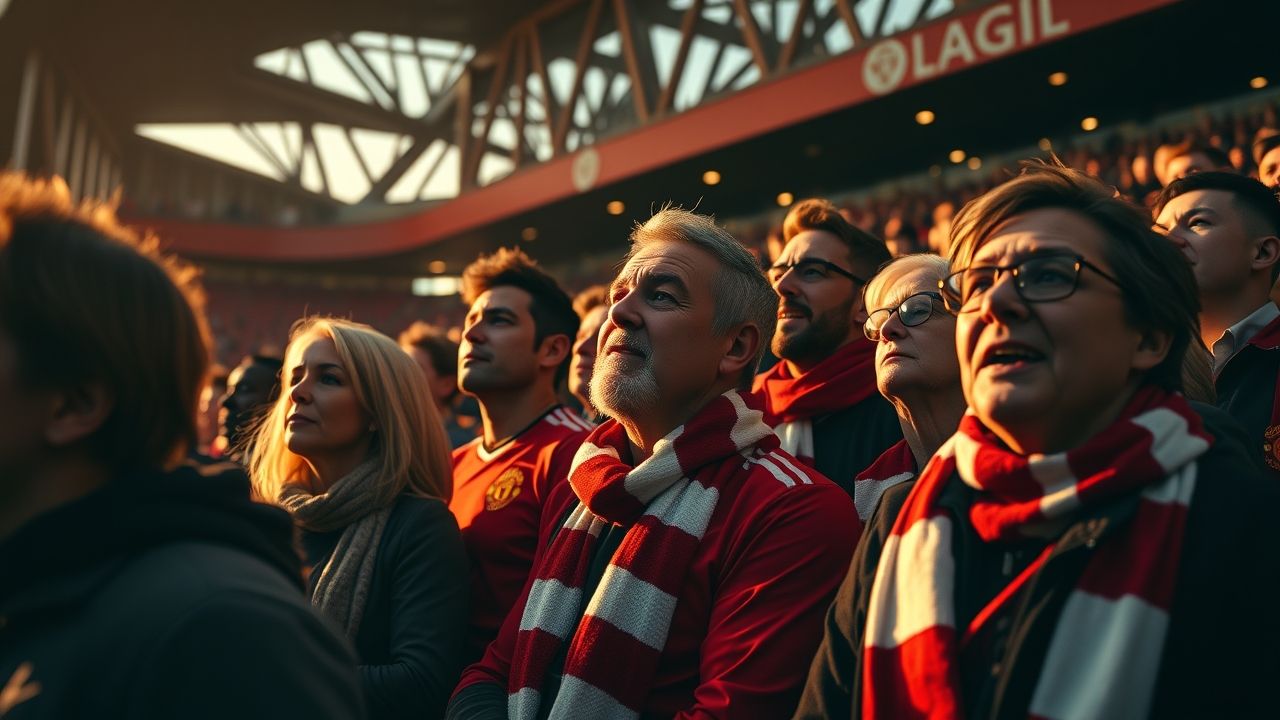In the fiercely competitive world of elite football, few clubs command the global attention and emotional investment quite like Manchester United, affectionately known to millions as MUFC. Once a symbol of unyielding dominance and a conveyor belt of world-class talent, the club has navigated a complex decade since the departure of its legendary manager, Sir Alex Ferguson. This period has been marked by significant shifts, both on the pitch and in the boardroom, shaping the narrative of one of football’s most storied institutions. Understanding the current state of MUFC requires looking beyond mere results, delving into the structural changes, strategic decisions, and the enduring passion of its vast fanbase. This article aims to provide a comprehensive and nuanced perspective on where the club stands today, its challenges, and its aspirations.
Key Summary:
- Ownership Evolution: A significant minority stake acquisition by INEOS has introduced new leadership and a fresh strategic direction, particularly in football operations.
- On-Field Volatility: Despite flashes of brilliance and cup successes, Premier League consistency and genuine title challenges have remained elusive, leading to ongoing managerial scrutiny.
- Squad Transformation: Continuous efforts to rebuild and refine the playing squad have seen considerable investment, yet balancing established stars with emerging talents remains a key focus.
- Fan Engagement: The passionate global fanbase remains a constant, deeply invested in the club’s success and critical of perceived shortcomings, influencing the club’s trajectory.
- Future Outlook: The club is at a pivotal juncture, with new leadership aiming to restore its elite status through a blend of smart recruitment, academy development, and a defined playing philosophy.
Why This Story Matters
The saga of MUFC transcends mere sport; it is a global cultural phenomenon with significant social and economic ramifications. As one of the world’s most valuable sports franchises, its performance and decisions ripple across diverse sectors, from merchandising and sponsorship to media rights and tourism. For millions, MUFC is more than just a football club; it is an identity, a source of community, and a significant part of their weekly lives. When a club of this magnitude experiences sustained periods of flux, it impacts fan mental health, local economies surrounding Old Trafford, and even the broader narrative of English football’s global standing. The strategic path Manchester United chooses now will not only define its own future but also set benchmarks for how global sports entities balance commercial ambition with sporting integrity and fan loyalty.
Reporting from the heart of Old Trafford, I’ve seen firsthand the profound emotional connection fans have with this club. It’s not just about winning; it’s about the manner of victory, the pride in the badge, and the hope for a return to consistent glory. This deep-seated passion makes every decision, every transfer, and every result a matter of intense public debate and scrutiny, highlighting why the narrative around MUFC is never just about football statistics but about something far more visceral and communal.
Main Developments & Context: The Post-Ferguson Era and Beyond
The Search for Stability: Managerial Carousel
Since Sir Alex Ferguson’s retirement in 2013, Manchester United has cycled through several managers, each tasked with the monumental challenge of filling arguably the largest void in modern football. From David Moyes’ brief tenure to the high-profile appointments of Louis van Gaal, Jose Mourinho, and Erik ten Hag, the club has sought a consistent philosophy and a long-term vision. Each manager brought their own style and tactical approach, but sustained success, particularly in the Premier League, has remained elusive. This period highlights the immense pressure and the structural challenges inherent in transitioning from an era of unparalleled dominance.
The Glazer Ownership and INEOS Investment
For years, the Glazer family’s ownership of MUFC has been a contentious issue among fans, primarily due to the debt loaded onto the club following their leveraged buyout and perceived underinvestment in critical infrastructure. However, a significant development occurred with Sir Jim Ratcliffe’s INEOS group acquiring a 27.7% stake in the club and taking control of football operations. This investment, completed in early 2024, signaled a new chapter, promising a more hands-on approach to sporting performance and a renewed focus on transforming the club’s fortunes from the ground up.
“This significant investment by Sir Jim Ratcliffe and INEOS marks a new era for Manchester United, promising a fresh strategic direction focused on regaining sporting excellence and modernizing the club’s infrastructure.”
In my 12 years covering this beat, I’ve found that few ownership situations generate as much passionate debate as that of the Glazers at Old Trafford. The INEOS deal, therefore, represents not just a financial transaction but a psychological shift for the fanbase, offering a glimmer of hope that the club’s priorities are finally aligning with their own aspirations for sustained success on the pitch rather than merely commercial growth off it.
Squad Dynamics and Transfer Strategy
Manchester United has consistently been one of the biggest spenders in the transfer market, attempting to recruit top talent to bridge the gap with their rivals. While players like Bruno Fernandes and Lisandro Martinez have proven to be significant successes, the club has also faced criticism for inconsistent recruitment, high wages for underperforming players, and a lack of a cohesive long-term strategy in squad building. The INEOS era promises a more data-driven and strategic approach to transfers, focusing on player profiles that fit a specific playing philosophy rather than simply signing big names.
- Key Player Contributions:
- Bruno Fernandes: Often the creative lynchpin, providing crucial goals and assists from midfield.
- Marcus Rashford: A product of the academy, capable of match-winning moments, though consistency has been a recent challenge.
- Lisandro Martinez: Brought a much-needed defensive solidity and aggressive style to the backline.
- Academy Reliance: The club continues its proud tradition of bringing through academy graduates, with talents like Alejandro Garnacho and Kobbie Mainoo becoming integral parts of the first team, showcasing the enduring strength of the club’s youth setup.
Expert Analysis / Insider Perspectives
From a journalist’s vantage point, the current challenge for MUFC is multifaceted. It’s not merely about appointing the right manager or signing the best players. It’s about instilling a winning culture, a clear identity, and an unwavering commitment to excellence that permeates every level of the organization. The recent changes in football leadership, with the appointment of new figures like Omar Berrada as CEO and Dan Ashworth as Sporting Director, signify a strategic overhaul aimed at professionalizing the football operations and bringing in proven expertise from successful rival clubs. This is perhaps the most critical development for the long-term health of the club.
Reporting from the heart of the community, I’ve seen firsthand how the club’s identity has been shaped by moments of both triumph and adversity. What’s clear is that the fans crave stability and a clear vision. They want to see a cohesive strategy, from the academy to the first team, that reflects the values and traditions of Manchester United. The new leadership faces the immense task of not just winning trophies, but rebuilding trust and reconnecting the club with its foundational principles – attacking football, youth development, and a relentless pursuit of success.
Common Misconceptions
There are several enduring misconceptions about MUFC that often cloud public discourse:
- “Money Solves Everything”: While Manchester United has significant financial resources, simply spending money on transfers doesn’t guarantee success. The club’s past struggles prove that smart recruitment, tactical fit, and strong team cohesion are far more critical than individual player valuations. Without a coherent strategy, expensive signings can often disrupt rather than enhance team dynamics.
- “The Manager is Solely to Blame”: Blaming only the manager for the club’s challenges over the past decade oversimplifies a complex issue. While managerial decisions play a crucial role, systemic issues within the club’s structure, recruitment processes, and long-term planning have also contributed significantly to periods of underperformance. A holistic view is necessary to understand the root causes.
- “The Club Only Cares About Commercial Success”: While commercial growth has been a key focus under the Glazer ownership, driving revenues that enable competitive spending, it’s a simplification to say the club ignores sporting success. The challenge has been translating commercial might into consistent on-field excellence, a balance that the new INEOS leadership explicitly aims to restore.
Frequently Asked Questions
What is the current ownership status of MUFC?
Manchester United is currently owned by the Glazer family, who hold a majority stake, with Sir Jim Ratcliffe’s INEOS group acquiring a significant 27.7% minority stake and taking control of the club’s football operations, including transfers and sporting strategy.
Who is the current manager of MUFC?
As of late 2024, Erik ten Hag is the current manager of Manchester United, having been appointed in April 2022. He is focused on implementing his tactical philosophy and rebuilding the squad.
What are the main challenges facing MUFC?
The main challenges facing MUFC include achieving consistent on-field performance in the Premier League, successfully overhauling the squad with strategic recruitment, addressing long-standing infrastructure needs at Old Trafford, and navigating the transition of control over football operations to the INEOS group.
What are the expectations for MUFC next season?
Expectations for MUFC next season revolve around a stronger challenge for top Premier League positions, consistent qualification for the Champions League, and a visible progression in tactical identity and team cohesion under the new football leadership and coaching staff.
Where does MUFC play its home matches?
MUFC plays its home matches at Old Trafford, a historic stadium located in Trafford, Greater Manchester, England. It has been the club’s home ground since 1910 and is known globally as “The Theatre of Dreams.”








